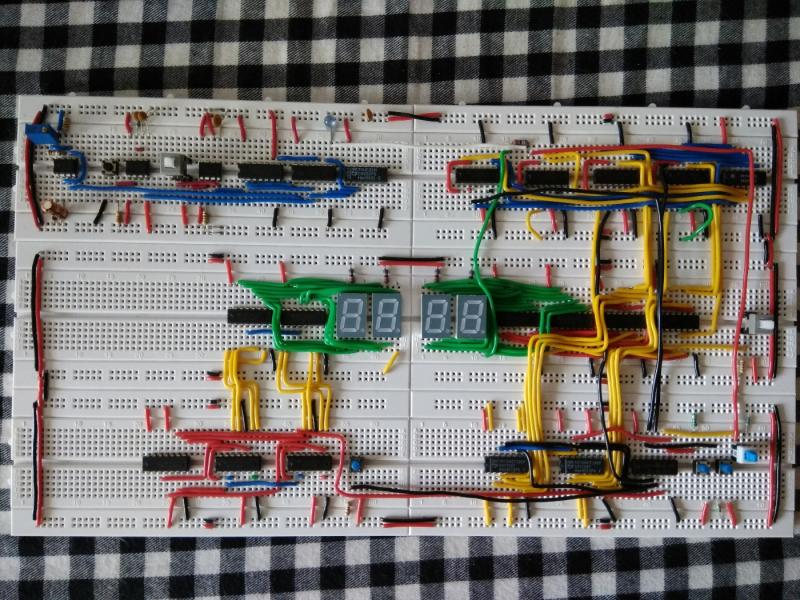Ranter
Join devRant
Do all the things like
++ or -- rants, post your own rants, comment on others' rants and build your customized dev avatar
Sign Up
Pipeless API

From the creators of devRant, Pipeless lets you power real-time personalized recommendations and activity feeds using a simple API
Learn More
Comments
-
 Ealdthir247yDo you mean R1 and R2, as in the two parts that a Potentiometer gets "split", when using the connector in the middle?
Ealdthir247yDo you mean R1 and R2, as in the two parts that a Potentiometer gets "split", when using the connector in the middle?
A potentiometer has a resistance rating, like for example 10k, which can be measured from pins 1 to 3. Turning the knob in one direction increases the resistance from pin 1 to pin 2, while decreasing it from pin 2 to pin 3. Turning it the other way has the opposite effect.
As far as the power handling is concerned, I would not use a potentiometer to control the voltage directly, as you would not get a constant voltage across different loads, and most of the power would just be burnt by the potentiometer. Its better to use a voltage regulator, which can also be controlled by a potentiometer. Just google for a voltage regulator circuit, there are lots of results. -
 rithvikp2707yAdding to what @Ealdthir said,
rithvikp2707yAdding to what @Ealdthir said,
Potentiometers have terrible efficiency. They are so terrible as power sources that I have never seen one being used as one outside some niche experiments in an electrical lab (if anyone's seen one, I am all ears). The one in the picture won't be able to handle 50w even, it'll burn off pretty quickly. I am assuming you are converting AC power supply from a wall outlet into 5V and 12V DC? For that you need a step-down transformer + AC-DC rectifier. Even then, 400w and especially the AC voltage of 110V/220V depending on where you live are both so high that you need some experience in circuit design and you'd need to sit down, do some research and design a proper circuit. Bottom line: do it only if you have a lot of free time and are not scared of blowing up capacitors. -
Already ordered two step-down...
have to wait one more month but that's no problem.
Thanks guys -
Btw I need those to control the spindle of my cheapest CNCs and stuff like that :D
-
 rithvikp2707y@GyroGearloose I hate to be the breaker of bad news but neither of those fit your needs. The first one supports only 3A current, the second one supports only 5A.
rithvikp2707y@GyroGearloose I hate to be the breaker of bad news but neither of those fit your needs. The first one supports only 3A current, the second one supports only 5A. -
@rithvikp Shit... Guess I can use them with 12V power supplies....
So... what would you recommend? mind doing a research for me? -
 rithvikp2707y@GyroGearloose Sadly, I have never worked with such high current designs :( I have always preferred to buy off-the-shelf supplies for such high wattage.
rithvikp2707y@GyroGearloose Sadly, I have never worked with such high current designs :( I have always preferred to buy off-the-shelf supplies for such high wattage.
Try on http://electronics.stackexchange.com/..., they'll be able to give you much better advice.
Related Rants

 From today, this beauty is 'ticking' on my desk :D
From today, this beauty is 'ticking' on my desk :D Today at school I borrowed an oscilloscope and a few capacitors and used a circuit I made at home to just demo...
Today at school I borrowed an oscilloscope and a few capacitors and used a circuit I made at home to just demo... My Mini-project for college. Any electronics enthusiasts here?
My Mini-project for college. Any electronics enthusiasts here?
Electronics question:
Potentiometers
Hey guys. I'm searching for potentiometer calculators but I have a problem...
Where do I get the R1 and R2 for a given pot?
I wanted to know what pot should I use to regulate 0-12V and 0-5V.
Also, can this potentiometer handle a 400w power supply current?:
https://build-electronic-circuits.com/...
I'm designing the box for my power supply and I want to regulate the voltage on one of the exits.
question
power suply
electronics
potentiometer